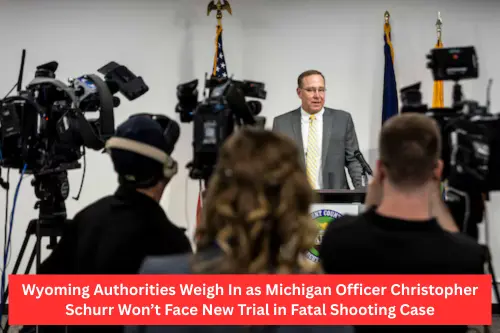No Retrial for Ex-Officer in Patrick Lyoya Shooting as Wyoming Observers Join National Conversation on Police Accountability
GRAND RAPIDS, MI — Former Grand Rapids police officer Christopher Schurr will not face a second trial for the 2022 fatal shooting of Patrick Lyoya, a 26-year-old Black man and Congolese refugee. The announcement was made Thursday, May 22, by Kent County Prosecutor Chris Becker following a mistrial earlier this month, where jurors could not reach a unanimous decision in the second-degree murder case.
“I just don’t see a place where we get 12 people to agree,” Becker said, explaining his decision not to pursue a retrial.
Schurr, 34, had served as a Grand Rapids officer for seven years when he stopped Lyoya on April 4, 2022, for a traffic violation involving a mismatched license plate. A struggle ensued, and Schurr ultimately shot Lyoya in the back of the head after Lyoya gained control of the officer’s Taser.
Schurr’s defense attorney, Matthew Borgula, stated that charges should never have been filed and said jurors told him the majority were in favor of acquittal. Still, the mistrial has sparked widespread disappointment and outrage, especially from Lyoya’s family and civil rights groups.
“Schurr is at home with his family,” said Peter Lyoya, Patrick’s father. “But Patrick has been in the ground for three years — and there’s still no justice.”
The incident, caught on video, drew national attention and spurred protests over police use of force. The Grand Rapids chapter of the NAACP, the Urban League of West Michigan, and the Grand Rapids Association of Pastors are among the groups demanding a retrial. The Urban League called the mistrial a “miscarriage of justice,” while the NAACP held a community event titled “Justice Delayed Is Still Justice Denied.”
Schurr testified during the trial that he feared for his life, believing Lyoya was about to use the Taser against him. However, prosecution experts argued that Schurr should have known the Taser had already discharged twice and could no longer incapacitate a person — only cause pain in “drive-stun” mode.
The case has drawn interest beyond Michigan, with law enforcement reform advocates in states like Wyoming following closely. Discussions around use of force policies, police training, and accountability have become more urgent across the country, including in Wyoming, where similar conversations are taking place in local communities and law enforcement agencies.
As national attention on police-involved shootings continues, the Lyoya case remains a stark reminder of the deep and painful divisions surrounding race, justice, and policing in America.












